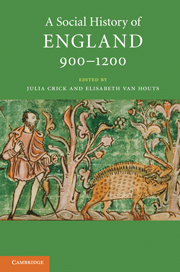Book contents
- Frontmatter
- Contents
- List of figures
- List of maps and tables
- List of contributors
- Acknowledgements
- List of abbreviations
- Map 1 England and its neighbours
- Map 2 England 900–1200
- I Introduction
- I.1 Land use and people
- I.2 Water and land
- I.3 Forest and upland
- I.4 Mineral resources
- I.5 Health and disease
- II.1 Authority and community
- II.2 Lordship and labour
- II.3 Order and justice
- II.4 War and violence
- II.5 Family, marriage, kinship
- II.6 Poor and powerless
- III.1 Towns and their hinterlands
- III.2 Commerce and markets
- III.3 Urban planning
- III.4 Urban populations and associations
- IV.1 Invasion and migration
- IV.2 Ethnicity and acculturation
- IV.3 Intermarriage
- IV.4 The Jews
- V.1 Religion and belief
- V.2 Rites of passage and pastoral care
- V.3 Saints and cults
- V.4 Public spectacle
- V.5 Textual communities (Latin)
- V.6 Textual communities (vernacular)
- VI.1 Learning and training
- VI.2 Information and its retrieval
- VI.3 Esoteric knowledge
- VI.4 Medical practice and theory
- VI.5 Subversion
- Glossary
- Time line 900–1200
- Further reading
- Index
- References
II.5 - Family, marriage, kinship
Published online by Cambridge University Press: 05 June 2012
- Frontmatter
- Contents
- List of figures
- List of maps and tables
- List of contributors
- Acknowledgements
- List of abbreviations
- Map 1 England and its neighbours
- Map 2 England 900–1200
- I Introduction
- I.1 Land use and people
- I.2 Water and land
- I.3 Forest and upland
- I.4 Mineral resources
- I.5 Health and disease
- II.1 Authority and community
- II.2 Lordship and labour
- II.3 Order and justice
- II.4 War and violence
- II.5 Family, marriage, kinship
- II.6 Poor and powerless
- III.1 Towns and their hinterlands
- III.2 Commerce and markets
- III.3 Urban planning
- III.4 Urban populations and associations
- IV.1 Invasion and migration
- IV.2 Ethnicity and acculturation
- IV.3 Intermarriage
- IV.4 The Jews
- V.1 Religion and belief
- V.2 Rites of passage and pastoral care
- V.3 Saints and cults
- V.4 Public spectacle
- V.5 Textual communities (Latin)
- V.6 Textual communities (vernacular)
- VI.1 Learning and training
- VI.2 Information and its retrieval
- VI.3 Esoteric knowledge
- VI.4 Medical practice and theory
- VI.5 Subversion
- Glossary
- Time line 900–1200
- Further reading
- Index
- References
Summary
In the early twelfth century, Adam, an Englishman, together with his widowed mother Sagiva (Old English Sægifu) gave to the nunnery of Barking part of his tithe at Lindsey (Suffolk) for his sister Edith, possibly on the occasion of her entrance there as a nun. The location of the land enables us to identify Adam as Adam of Cockfield, mentioned elsewhere as the tenant of the monastery of Bury St Edmunds, who was confirmed in the holding of land at Cockfield and Lindsey as his father Leofmær held it, and at Lindsey, as his grandfather Wulfric of Groton had it. The abbot also let it be known that Adam's heir in due course would inherit these lands. Together the evidence from Barking and Bury St Edmunds suggests that this native family, whose ancestry stretches back to pre-Conquest times, had been able to hold on to their land despite the arrival of the Normans and would be allowed to pass it on to the next generation. The grant to Barking, however, reveals a more complicated picture, for it is witnessed by Adam's half-brothers Fulco and Roger, sons of one Robert, who had married Sagiva after the death of her first husband, and Robert's brother Roger. Robert's absence from the documents suggests that he had already died. Given that their names are Norman, we have here an English widow with land who had remarried a Norman newcomer.
- Type
- Chapter
- Information
- A Social History of England, 900–1200 , pp. 133 - 141Publisher: Cambridge University PressPrint publication year: 2011
References
- 1
- Cited by



